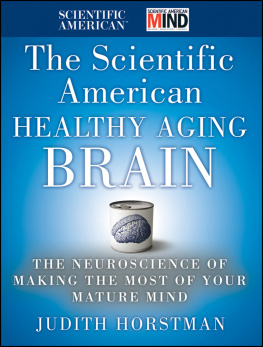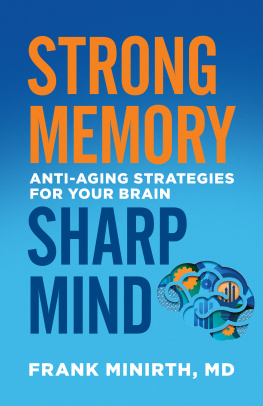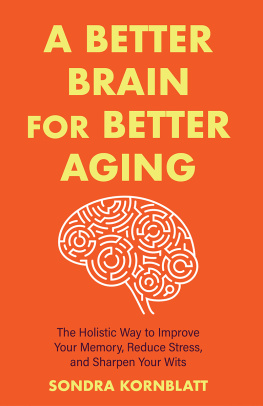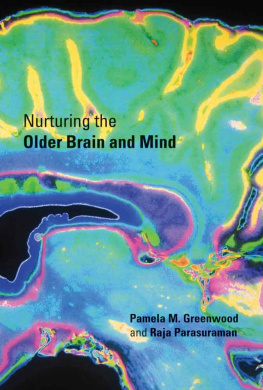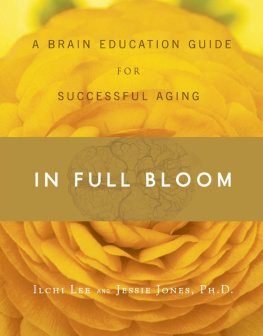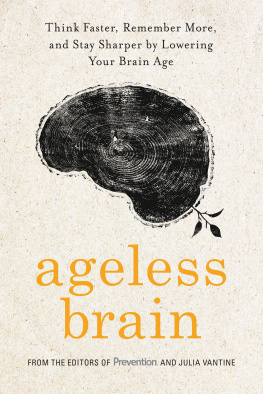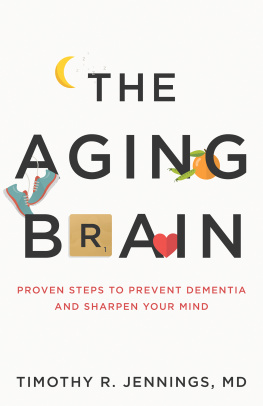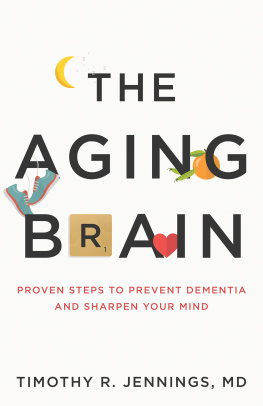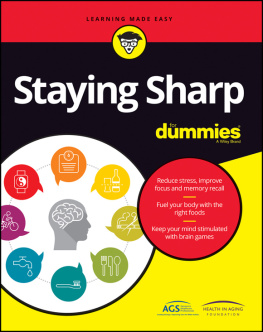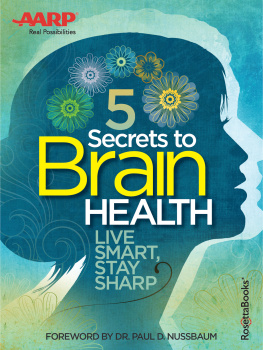

Feel better every day
Maybe youre ready to master the challenges and fears that have held you back. Or maybe you want to delve deeper into your relationships. Or maybe you just want to take the next step in achieving your dreams.
Welcome to self-help for grown-ups. Where do you turn for help?
Dedicated to helping you live your best life, AARP offers the best among the experts and the latest and most credible research. No-nonsense, solid advice. Suggestions for healing and growth. Guidance to get you from here to there.
Are you ready? Lets go.
AARP is a nonprofit, nonpartisan membership organization that helps people 50 and older improve their lives. For more than 50 years, AARP has been serving our members and society by creating positive social change. AARPs mission is to enhance the quality of life for all as we age; lead positive social change; and deliver value to members through information, service and advocacy.
Previous Books in the Scientific American Brain Series
The Scientific American Book of Love, Sex, and the Brain
The Scientific American Brave New Brain
The Scientific American Day in the Life of Your Brain
Copyright 2012 by John Wiley & Sons, Inc., and Scientific American, a division of Nature America, Inc. All rights reserved.
Published by Jossey-Bass
A Wiley Imprint
One Montgomery Street, Suite 1200, San Francisco, CA 94104-4594www.josseybass.com
Front cover artwork Photolibrary.
No part of this publication may be reproduced, stored in a retrieval system, or transmitted in any form or by any means, electronic, mechanical, photocopying, recording, scanning, or otherwise, except as permitted under Section 107 or 108 of the 1976 United States Copyright Act, without either the prior written permission of the publisher, or authorization through payment of the appropriate per-copy fee to the Copyright Clearance Center, Inc., 222 Rosewood Drive, Danvers, MA 01923, 978-750-8400, fax 978-646-8600, or on the Web at www.copyright.com. Requests to the publisher for permission should be addressed to the Permissions Department, John Wiley & Sons, Inc., 111 River Street, Hoboken, NJ 07030, 201-748-6011, fax 201-748-6008, or online at www.wiley.com/go/permissions.
The contents of this work are intended to further general scientific research, understanding, and discussion only and are not intended and should not be relied upon as recommending or promoting a specific method, diagnosis, or treatment by physicians for any particular patient. The publisher and the author make no representations or warranties with respect to the accuracy or completeness of the contents of this work and specifically disclaim all warranties, including without limitation any implied warranties of fitness for a particular purpose. In view of ongoing research, equipment modifications, changes in governmental regulations, and the constant flow of information relating to the use of medicines, equipment, and devices, the reader is urged to review and evaluate the information provided in the package insert or instructions for each medicine, equipment, or device for, among other things, any changes in the instructions or indication of usage and for added warnings and precautions. Readers should consult with a specialist where appropriate. The fact that an organization or Web site is referred to in this work as a citation and/or a potential source of further information does not mean that the author or the publisher endorses the information that the organization or Web site may provide or recommendations it may make. Further, readers should be aware that Internet Web sites listed in this work may have changed or disappeared between when this work was written and when it is read. No warranty may be created or extended by any promotional statements for this work. Neither the publisher nor the author shall be liable for any damages arising herefrom.
Jossey-Bass books and products are available through most bookstores. To contact Jossey-Bass directly call our Customer Care Department within the U.S. at 800-956-7739, outside the U.S. at 317-572-3986, or fax 317-572-4002.
Wiley publishes in a variety of print and electronic formats and by print-on-demand. Some material included with standard print versions of this book may not be included in e-books or in print-on-demand. If this book refers to media such as a CD or DVD that is not included in the version you purchased, you may download this material at http://booksupport.wiley.com. For more information about Wiley products, visit www.wiley.com.
Library of Congress Cataloging-in-Publication Data
Horstman, Judith.
The Scientific American healthy aging brain : the neuroscience of making the most of your mature mind / Judith Horstman. 1st ed.
p. cm.
Includes bibliographical references and index.
ISBN 978-0-470-64773-8 (cloth); ISBN 978-1-118-22087-0 (ebk.); ISBN 978-1-118-23464-8 (ebk.); ISBN 978-1-118-25915-3 (ebk.)
1. BrainPsychophysiology. 2. BrainAging. 3. Neurosciences. I. Scientific American. II. Title.
QP376.H7554 2012
612.8'2dc23
2012001580
To all who went there before us, and showed us the way to age well
ACKNOWLEDGMENTS
A bit more than four years ago, I received an e-mail from Alan Rinzler, an eminent editor I knew by reputation but had never met, asking if Id be interested in writing a book in collaboration with Scientific American about a day in the life of your brain. That was the beginning of what would turn out to be a challenging series of four brain books in four years. He edited three and set the tone for this one before retiring from Jossey-Bass last year. Thank you, Alan. And heres to all of those at Jossey-Bass and John Wiley & Sons who made these books possible, most of whom have worked with me on all four books: Paul Foster, who started it all with an idea about a day in the life of your brain; my editors, Nana Twumasi and Marjorie McAneny, who proffered calming support as well as edits; Carol Hartland, the production genius who pulled it all together; Bev Miller, an extraordinarily insightful copyeditor; Paula Goldstein, the terrific book designer; and the marketing crew who put my books in your hands, including Jennifer Wenzel, Samantha Rubenstein, and Jeff Puda.
Kelly A. Dakin has been of inestimable help with research and fact checks through all four books as she earned her Harvard doctorate in neurobiology. Brianna Smith, an amazing research assistant, trolled years of Scientific American articlesspeaking of which, thanks to Karin Tucker and Diane McGarvey of Scientific American for their patience in finding and approving the use of hundreds of articles. And many thanks to literary agent Andrea Hurst, the godmother of the brain books who first suggested my name to Alan.
Many distinguished scientists have given me their time, expertise, and support, for which I am so very grateful. Two in particular have helped with all four of these books, reading, correcting my errors, and suggesting edits: John Dowling of Harvard College, the Llura and Gordon Gund Professor of Neuroscience, who also generously provided the basic information on brain development in this book; and R. Douglas Fields, chief of the Nervous System Development and Plasticity Section, National Institutes of Health, and editor in chief of the journal Neuron Glia Biology , who is as extraordinary a writer as he is a scientist. All errors are mine.
Next page
